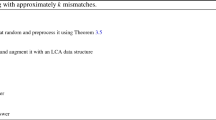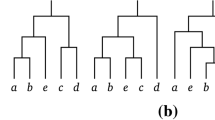Abstract
Given a machine U, a c-short program for x is a string p such that U(p) = x and the length of p is bounded by c + (the length of a shortest program for x). We show that for any standard Turing machine, it is possible to compute in polynomial time on input x a list of polynomial size guaranteed to contain a \({\operatorname{O}\bigl({\mathrm{log}}|x|\bigr)}\)-short program for x. We also show that there exists a computable function that maps every x to a list of size |x|2 containing a \({\operatorname{O}\bigl(1\bigr)}\)-short program for x. This is essentially optimal because we prove that for each such function there is a c and infinitely many x for which the list has size at least c|x|2. Finally we show that for some standard machines, computable functions generating lists with 0-short programs must have infinitely often list sizes proportional to 2|x|.
Similar content being viewed by others
References
B. Bauwens (2010). Computability in statistical hypotheses testing, and characterizations of independence and directed influences in time series using Kolmogorov complexity. Ph.D. thesis, Ghent University, Faculty of Engineering.
B. Bauwens, A. Makhlin, N. Vereshchagin & M. Zimand (2013). Short lists with short programs in short time. In the 28th IEEE Conference in Computational Complexity, Stanford, CA, June 5–7, 2013, 98–108.
Bauwens B., Shen A. (2014) Complexity of complexity and strings with maximal plain and prefix Kolmogorov complexity. The Journal of Symbolic Logic 79(02): 620–632
Beigel R., Buhrman H.M., Fejer P., Fortnow L., Grabowski P., Longpre L., Muchnik A., Stephan F., Torenvliet L. (2006) Enumerations of the Kolmogorov Function. The Journal of Symbolic Logic 71(2): 501–528
H. Buhrman, L. Fortnow & S. Laplante (2001). Resource-Bounded Kolmogorov Complexity Revisited. SIAM Journal on Computing 31(3), 887–905.
L. Fortnow, J. M. Hitchcock, A. Pavan, N. V. Vinodchandran & F. Wang (2011). Extracting Kolmogorov complexity with applications to dimension zero-one laws. Information and Computation 209(4), 627–636.
Gacs P. (1974) On the symmetry of algorithmic information. Soviet Mathematical Doklady 15: 1477–1480
P. Hall (1935). On representatives of subsets. Journal of the London Mathematical Society 1(10), 26–30.
J. M. Hitchcock, A. Pavan & N. V. Vinodchandran (2011). Kolmogorov Complexity in Randomness Extraction. Transactions on Computation Theory 3(1), 1.
T. Kova̋ri, V.T. Sòs & P. Turàn (1954). On a problem of K. Zarankiewicz. Colloquium Mathematicae 3, 50–57.
A. H. Lachlan (1970). On Some Games Which Are Relevant to the Theory of Recursively Enumerable Sets. Annals of Mathematics 91(2), 291–310. http://www.jstor.org/stable/1970579.
Muchnik A.A. (2002) Conditional complexity and codes. Theoretical Computer Science 271(1–2): 97–109
A. A. Muchnik, I. Mezhirov, A. Shen & N. Vereshchagin (2010). Game interpretation of Kolmogorov complexity. Unpublished.
D. Musatov (2011). Improving the Space-Bounded Version of Muchnik’s Conditional Complexity Theorem via “Naive" Derandomization. In International Computer Science Symposium in Russia, 64–76.
D. Musatov (2012). Space-Bounded Kolmogorov Extractors. In International Computer Science Symposium in Russia, 266–277.
D. Musatov, A. E. Romashchenko & A. Shen (2011). Variations on Muchnik’s Conditional Complexity Theorem. Theory of Computation Systems 49(2), 227–245.
J. Radhakrishnan & A. Ta-Shma (2000). Tight bounds for dispersers, extractors, and depth-two superconcentrators. SIAM Journal on Discrete Mathematics 13(1), 2–24.
C.P. Schnorr (1975) Optimal Enumerations and Optimal Gödel Numberings. Mathematical Systems Theory 8(2): 182–191
A. Shen (2012). Game arguments in computability theory and algorithmic information theory. In Conference on Computability in Europe. Springer, Berlin Heidelberg.
M. Sipser (1983). A Complexity Theoretic Approach to Randomness. In Proceedings of the 15th ACM Symposium on Theory of Computing, 330–335.
F. Stephan (2013). Personal Communication.
A. Ta-Shma, C. Umans & D. Zuckerman (2007). Lossless Condensers, Unbalanced Expanders, And Extractors. Combinatorica 27(2), 213–240.
J. Teutsch (2014). Short lists for shortest descriptions in short time. Computational Complexity 23(4), 565–583. http://dx.doi.org/10.1007/s00037-014-0090-3.
N. Vereshchagin (2008). Kolmogorov complexity and Games. Bulletin of the European Association for Theoretical Computer Science 94, 51–83.
Vereshchagin N. (2016) Algorithmic minimal sufficient statistics: a new approach. Theory of Computing Systems 58(3): 463–481
M. Zimand (2010a). Possibilities and impossibilities in Kolmogorov complexity extraction. SIGACT News 41(4), 74–94.
M. Zimand (2010b). Two Sources Are Better than One for Increasing the Kolmogorov Complexity of Infinite Sequences. Theory of Computing Systems 46(4), 707–722.
M. Zimand (2011). Symmetry of Information and Bounds on Nonuniform Randomness Extraction via Kolmogorov Extractors. In IEEE Conference on Computational Complexity, 148–156.
Zimand M. (2013) Generating Kolmogorov random strings from sources with limited independence. Journal of Logic and Computation 23(4): 909–924
M. Zimand (2014). Short Lists with Short Programs in Short Time - A Short Proof. In Language, Life, Limits - 10th Conference on Computability in Europe, CiE 2014, Budapest, Hungary, June 23–27, 2014. Proceedings, 403–408.
Author information
Authors and Affiliations
Corresponding author
Rights and permissions
About this article
Cite this article
Bauwens, B., Makhlin, A., Vereshchagin, N. et al. Short lists with short programs in short time. comput. complex. 27, 31–61 (2018). https://doi.org/10.1007/s00037-017-0154-2
Received:
Published:
Issue Date:
DOI: https://doi.org/10.1007/s00037-017-0154-2




